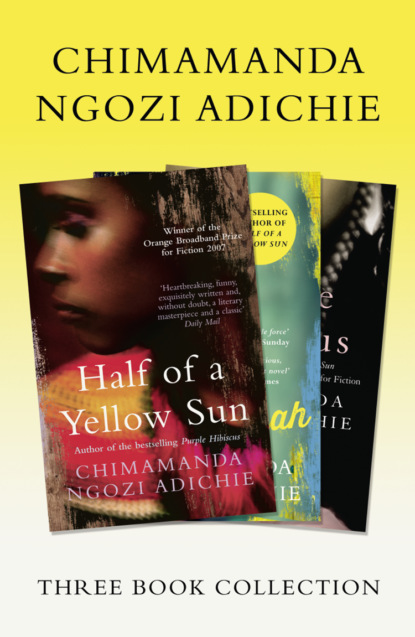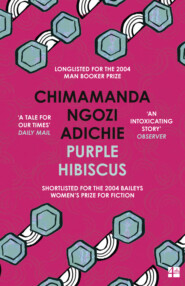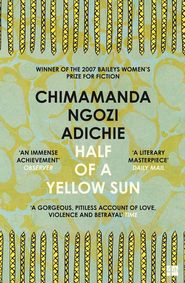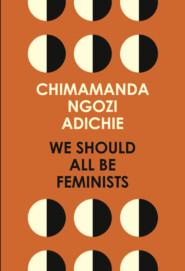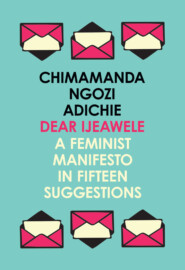По всем вопросам обращайтесь на: info@litportal.ru
(©) 2003-2024.
✖
Half of a Yellow Sun, Americanah, Purple Hibiscus: Chimamanda Ngozi Adichie Three-Book Collection
Автор
Год написания книги
2018
Настройки чтения
Размер шрифта
Высота строк
Поля
Nnakwanze made as if to help Arize up, but she brushed him aside. ‘I have told you people that I am not sick. I am only pregnant.’
Olanna was pleased that the house in Lagos would be empty. Her father had called to say they were going overseas. She knew it was because he wanted to be away until things calmed down, because he was wary of his ten per cents and lavish parties and slick connections, but neither he nor her mother said so. They called it a holiday. It was their policy to leave things unsaid, the same way they pretended not to notice that she and Kainene no longer spoke and that she came home only when she was sure Kainene was not visiting.
In the airport taxi, Arize taught Baby a song while Olanna watched Lagos careen by: the tumultuous traffic, the rusty buses and exhausted masses waiting for them, the touts, the beggars sliding on flat, wooden trolleys, the shabby hawkers thrusting trays towards people who either would not or could not buy.
The driver stopped in front of her parents’ walled compound in Ikoyi. He peered at the high gate. ‘The minister they killed used to live around here, abi, aunty?’ he asked. Olanna pretended not to have heard and instead said to Baby, ‘Now, look what you did to your dress! Hurry inside so we can wash it off!’
Later, her mother’s driver, Ibekie, took them to Kingsway. The supermarket smelt of new paint. Arize walked from aisle to aisle, cooing, touching the plastic wrappings, picking out baby clothes, a pink pram, a plastic doll with blue eyes.
‘Everything is so shiny in supermarkets, Sister,’ Arize said, laughing. ‘No dust!’
Olanna held up a white dress trimmed with pink lace. ‘O maka. This is lovely.’
‘It’s too expensive,’ Arize said.
‘Nobody asked you.’
Baby pulled down a doll from a low shelf and turned it upside down, and it let out a crying sound.
‘No, Baby.’ Olanna took the doll and placed it back.
They shopped for a while longer and then left for Yaba market, where Arize could shop for fabrics for herself. Tejuosho Road was crowded, families huddled around pots of bubbling food, women roasting corn and plantains in charred basins, bare-chested men loading bags into lorries with hand-painted wisdoms: no condition is permanent. god knows best. Ibekie parked near the newspaper stands. Olanna glanced at the people standing and reading the Daily Times and her feet grew light with pride. They were reading Odenigbo’s article, she was sure; it was easily the best there. She had edited it herself and toned down his rhetoric, so that his argument – that only a unitary government could remove the divisions of regionalism – was clearer.
She took Baby’s hand and led the way past the roadside hawkers who sat under umbrellas with batteries and padlocks and cigarettes carefully arranged on enamel trays. The main market entrance was strangely empty. Then Olanna saw the crowd ahead. A man in a yellowed singlet stood at the centre while two men slapped him, one after the other, methodical, leathery-sounding slaps. ‘Why now? Why are you denying?’ The man stared at them, blank, bending his neck slightly after each slap. Arize stopped.
Somebody from the crowd called out, ‘We are counting the Igbo people. Oya, come and identify yourself. You are Igbo?’
Arize muttered under her breath, ‘I kwuna okwu,’ as if Olanna was thinking of saying anything, and then shook her head and started to speak fluent, loud Yoruba, all the while casually turning so they could go back the way they had come. The crowd lost interest in them. Another man in a safari suit was being slapped on the back of the head. ‘You are Igbo man! Don’t deny it! Simply identify yourself!’
Baby began to cry. ‘Mummy Ola! Mummy Ola!’
Olanna picked Baby up. She and Arize did not talk until they got back in the car. Ibekie had already reversed and kept glancing at the rearview mirror. ‘I saw people running,’ he said.
‘What is happening?’ Olanna asked.
Arize shrugged. ‘We hear rumours that they have been doing this in Kaduna and Zaria since the coup; they go out in the streets and start to harass Igbo people because they said the coup was an Igbo coup.’
‘Ezi okwu? Really?’
‘Yes, Aunty,’ Ibekie said quickly, as if he had been waiting for the opportunity to speak. ‘My uncle in Ebutte Metta does not sleep in his house any more since the coup. All his neighbours are Yoruba, and they said some men have been looking for him. He sleeps in different houses every night, while he takes care of his business. He has sent his children back home.’
‘Ezi okwu? Really?’ Olanna repeated. She felt hollow. She did not know that things had come to this; in Nsukka, life was insular and the news was unreal, functioning only as fodder for the evening talk, for Odenigbo’s rants and impassioned articles.
‘Things will calm down,’ Arize said, and touched Olanna’s arm. ‘Don’t worry.’
Olanna nodded and looked out at the words printed on a nearby lorry: NO TELEPHONE TO HEAVEN. She could not believe how easy it had been to deny who they were, to shrug off being Igbo.
‘She will wear that white dress for her christening, Sister,’ Arize said.
‘What, Ari?’
Arize pointed at her belly. ‘Your goddaughter will wear that white dress for her christening. Thank you so much, Sister.’
The light in Arize’s eyes made Olanna smile; things would indeed calm down. She tickled Baby, but Baby did not laugh. Baby stared back at her with frightened eyes that were not yet dried of tears.
9 (#u3c1576f1-c916-57b7-bb43-a63c028a7109)
Richard watched as Kainene zipped up the lilac dress and turned to him. The hotel room was brightly lit, and he looked at her and at her reflection in the mirror behind her.
‘Nke a ka mma,’ he said. It was prettier than the black dress on the bed, the one she had earlier picked out for her parents’ party. She bowed mockingly and sat down to put on her shoes. She looked almost pretty with her smoothing powder and red lipstick and relaxed demeanour, not as knotted up as she had been lately, chasing a contract with Shell-BP. Before they left, Richard brushed aside some of her wig hair and kissed her forehead, to avoid spoiling her lipstick.
There were garish balloons in her parents’ living room. The party was underway. Stewards in black and white walked around with trays and fawning smiles, their heads held inanely high. The champagne sparkled in tall glasses, the chandeliers’ light reflected the glitter of jewellery on fat women’s necks, and the High Life band in the corner played so loudly, so vigorously, that people clumped close together to hear one another.
‘I see many Big Men of the new regime,’ Richard said.
‘Daddy hasn’t wasted any time in ingratiating himself,’ Kainene said in his ear. ‘He ran off until things calmed down, and now he’s back to make new friends.’
Richard scanned the rest of the room. Colonel Madu stood out right away, with his wide shoulders and wide face and wide features and head that was above everyone else’s. He was talking to an Arab man in a tight dinner jacket. Kainene walked over to say hello to them and Richard went to look for a drink, to avoid talking to Madu just yet.
Kainene’s mother came up and kissed his cheek; he knew she was drunk, or she would have greeted him with the usual frosty ‘How do you do?’ Now, though, she told him he looked well and cornered him at an unfortunate end of the room, with the wall to his back and an intimidating piece of sculpture, something that looked like a snarling lion, to his side.
‘Kainene tells me you are going home to London soon?’ she asked. Her ebony complexion looked waxy with too much make-up. There was something nervous about her movements.
‘Yes. I’ll be away for about ten days.’
‘Just ten days?’ She half smiled. Perhaps she had hoped he would be away for longer, so she could finally find a suitable partner for her daughter. ‘To visit your family?’
‘My cousin Martin is getting married,’ Richard said.
‘Oh, I see.’ The rows and rows of gold around her neck weighed her down and made her head look slumped, as if she was under great strain and, in trying so hard to hide it, made it all the more obvious. ‘Maybe we’ll have a drink in London then. I’m telling my husband that we should take another small holiday. Not that anything will happen, but not everybody is happy with this unitary decree the government is talking about. It’s just nicer to be away until things are settled. We may leave next week but we are not telling anybody, so keep it to yourself.’ She touched his sleeve playfully, and Richard saw a glimpse of Kainene in the curve of her lips. ‘We are not even telling our friends the Ajuahs. You know Chief Ajuah, who owns the bottling company? They are Igbo, but they are Western Igbo. I hear they are the ones who deny being Igbo. Who knows what they will say that we have done? Who knows? They will sell other Igbo people for a tarnished penny. A tarnished penny, I’m telling you. Do you want another drink? Wait here and I’ll get another drink. Just wait here.’
As soon as she lurched away, Richard went looking for Kainene. He found her on the balcony with Madu, standing and looking down at the swimming pool. The smell of roasting meat was thick in the air. He watched them for a while. Madu’s head was slightly cocked to the side as Kainene spoke, her body looked frail next to his huge frame, and they seemed somehow to fit effortlessly. Both very dark, one tall and thin, the other taller and huge. Kainene turned and saw him.
‘Richard,’ she said.
He joined them, shook hands with Madu. ‘How are you, Madu? Ana-emekwa?’ he asked, eager to speak first. ‘How is life in the North?’
‘Nothing to complain about,’ Madu said in English.
‘You didn’t come with Adaobi?’ He did wish the man would come out more often with his wife.
‘No,’ Madu said, and sipped his drink; it was clear he had not wanted anybody to disturb their chat.
‘I see my mother was entertaining you, how exciting,’ Kainene said. ‘Madu and I were stuck with Ahmed there for a while. He wants to buy Daddy’s warehouse in Ikeja.’
‘Your father will not sell anything to him,’ Madu declared, as if it were his decision to make. ‘Those Syrians and Lebanese already own half of Lagos, and they are all bloody opportunists in this country.’
‘I would sell to him if he stopped smelling so awfully of garlic,’ Kainene said.





